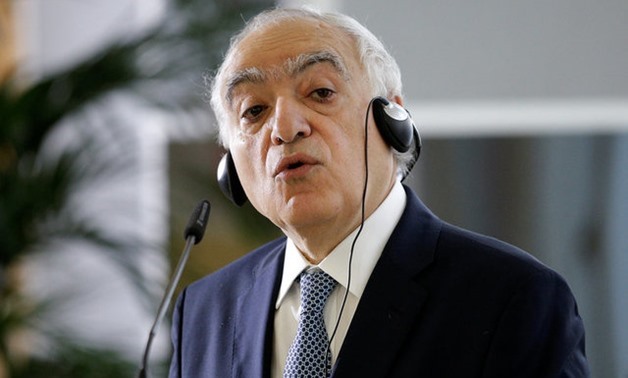
U.N. Special Representative for Libya Ghassan Salame talks during a news conference in Rome - REUTERS
CAIRO – 1 May 2018: Ghassan Salame, head of the U.N. mission in Libya, met Sunday in Cairo with a number of followers of late Libyan President Muammar Gaddafi, who was killed by rebels in 2011.
Many members of the Libyan National Struggle Front, the Popular Front for the Liberation of Libya, the Libyan National Assembly and other national movements, in addition to many members of civil society organizations, attended the meeting.
In a press statement on Monday, a number of Gaddafi followers praised the U.N. for listening to the supporters of the Libyan Arab Jamahiriya established by Gaddafi following the toppling of King Idris of Libya in 1969 and the abolishment of the monarchy.
On September 20, Salame presented a plan to the U.N. Security Council with the aim of involving all Libyan parties and holding elections as soon as possible.
The statement expressed concerns about the future of Libya, saying that in order for the U.N. initiative to be effective, an appropriate environment for discussion needs to be provided. In addition, exterior interventions in Libya’s affairs should be eliminated, as they do not highlight the Libyan people’s interests.
Gaddafi followers also called for the rehabilitation of the reputation of Gaddafi, his company and all the martyrs, affirming that hiding their corpses is a violation of international law and humanitarian principles. The National Transition Council buried Gaddafi and his son Mutassim in a secret location in the desert.
The statement also stressed the rights of Gaddafi followers to participate in the decision making, saying that political discussion is the appropriate way to solve the Libyan issue. However, all parties need to prove good intentions toward Gaddafi followers.
The statement also urged the International Criminal Court to stop chasing some of the Jamahiriya leaders, including Gaddafi's son, Saif al-Islam, who is set to run in the upcoming presidential election, according to an announcement by Ayman Boras, the man in charge of the political reform program of Saif al-Islam.
 Saif al-Islam Gaddafi, son of late Libyan leader Muammar Gaddafi, attends a hearing behind bars in a courtroom in Zintan May 15, 2014. REUTERS
Saif al-Islam Gaddafi, son of late Libyan leader Muammar Gaddafi, attends a hearing behind bars in a courtroom in Zintan May 15, 2014. REUTERS
In an interview with Egypt Today in April, Libyan Minister of Foreign Affairs Mohamed Taher Siala praised Egypt’s political initiative to host all of the military factions in order to reach a unified and secured country.
Egypt has hosted several meetings to bring Libya’s conflicted factions to the negotiations table, alongside members of Tobruk’s House of Representatives, to resolve the Libyan crisis and amend the Skhirat agreement, which aims at ending Libya’s civil war.
In December 2016, Cairo hosted a conference attended by Libyan officials and representatives from the country’s numerous factions, where they issued five proposed amendments to the agreement. The conference concluded with a decision to amend the eighth article of the Skhirat agreement that outlined the jurisdiction of the Libyan army chief commander.
Negotiations to unify the Libyan military were held as a part of Egypt’s initiative that kicked off in July 2017 to unify the military institutions.


Comments
Leave a Comment